Unit 5 Wild animals Grammar课件
文档属性
| 名称 | Unit 5 Wild animals Grammar课件 | 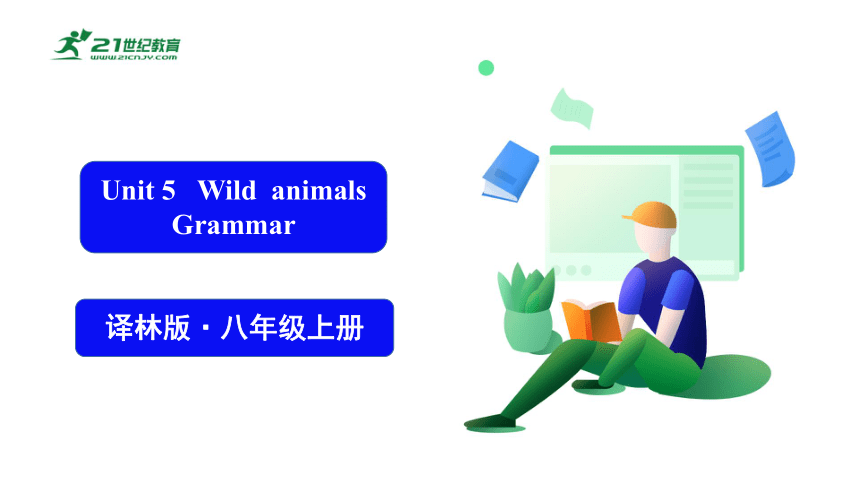 | |
| 格式 | zip | ||
| 文件大小 | 2.1MB | ||
| 资源类型 | 试卷 | ||
| 版本资源 | 牛津译林版 | ||
| 科目 | 英语 | ||
| 更新时间 | 2022-11-03 15:59:38 | ||
图片预览

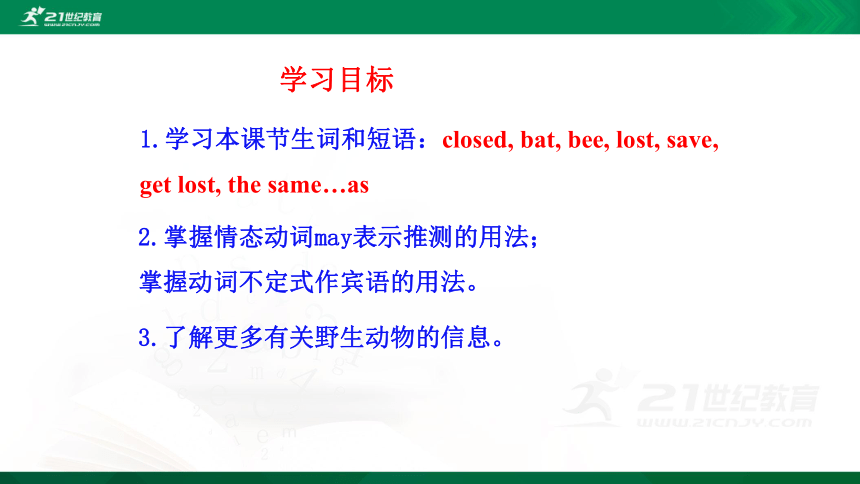
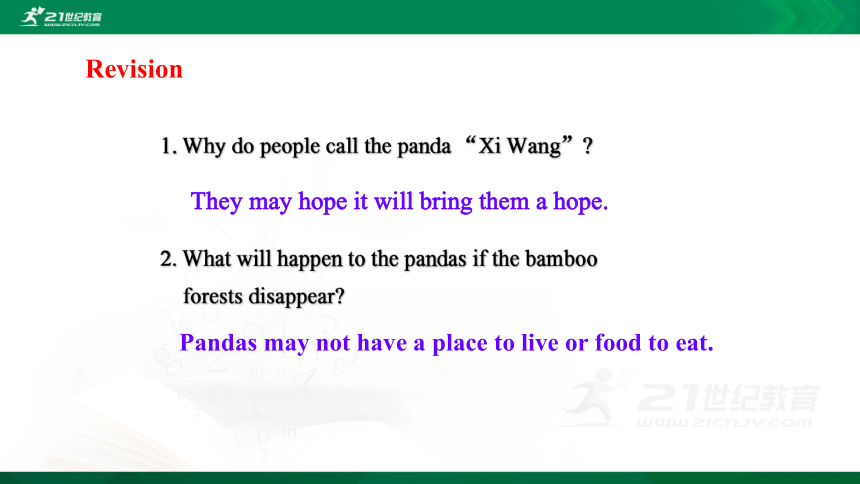
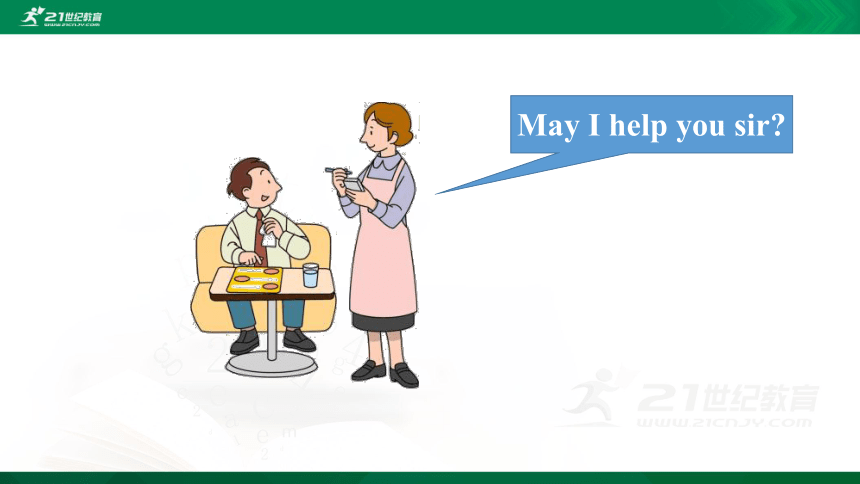
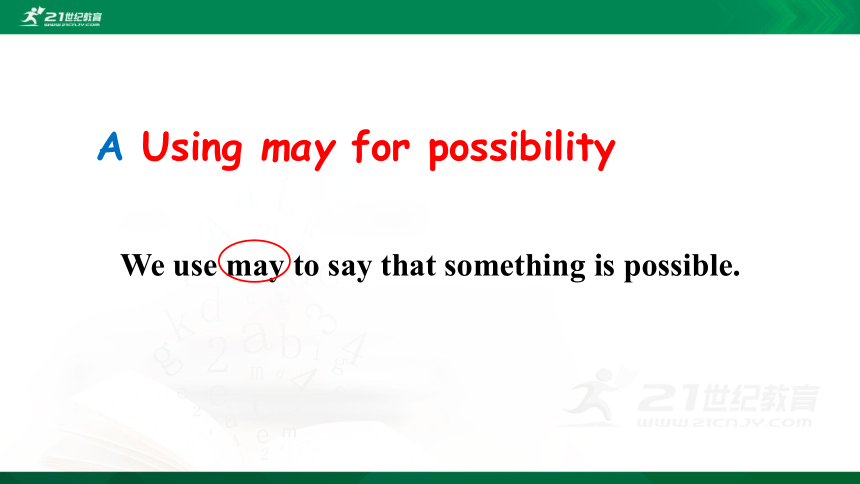
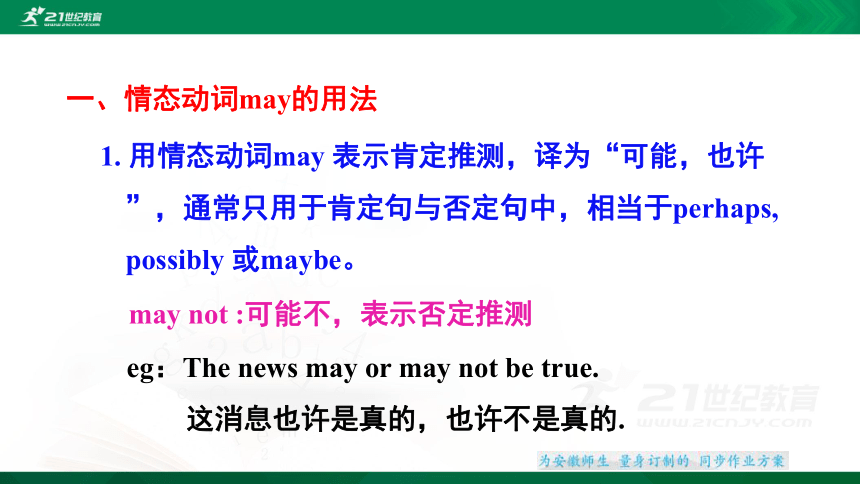
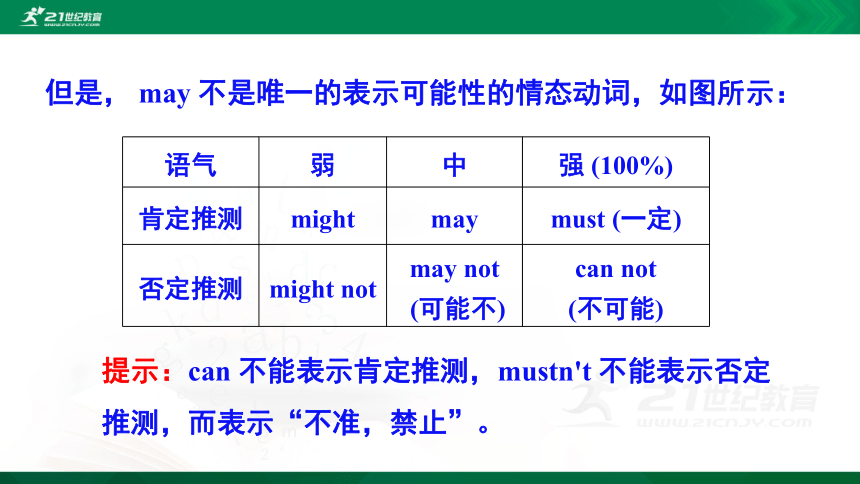
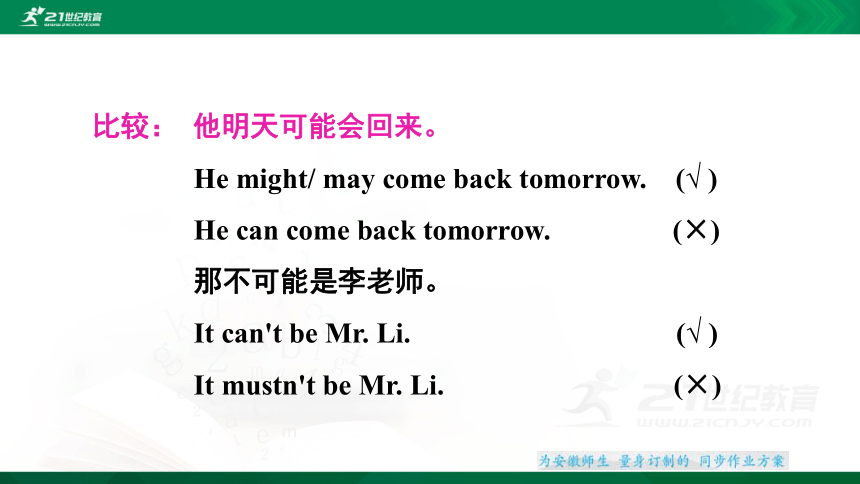

文档简介
(共26张PPT)
译林版·八年级上册
Unit 5 Wild animals
Grammar
1.学习本课节生词和短语:closed, bat, bee, lost, save, get lost, the same…as
3.了解更多有关野生动物的信息。
2.掌握情态动词may表示推测的用法;
掌握动词不定式作宾语的用法。
学习目标
1. Why do people call the panda “Xi Wang”
2. What will happen to the pandas if the bamboo
forests disappear
They may hope it will bring them a hope.
Pandas may not have a place to live or food to eat.
Revision
May I help you sir
We use may to say that something is possible.
A Using may for possibility
1. 用情态动词may 表示肯定推测,译为“可能,也许”,通常只用于肯定句与否定句中,相当于perhaps, possibly 或maybe。
一、情态动词may的用法
may not :可能不,表示否定推测
eg:The news may or may not be true.
这消息也许是真的,也许不是真的.
但是, may 不是唯一的表示可能性的情态动词,如图所示:
语气 弱 中 强 (100%)
肯定推测 might may must (一定)
否定推测 might not may not (可能不) can not
(不可能)
提示:can 不能表示肯定推测,mustn't 不能表示否定推测,而表示“不准,禁止”。
比较: 他明天可能会回来。
He might/ may come back tomorrow. (√ )
He can come back tomorrow. (×)
那不可能是李老师。
It can't be Mr. Li. (√ )
It mustn't be Mr. Li. (×)
2. may 除了可以表示推测,还可以表示请求,许可,允许,通常用于疑问句中。
eg:—May I go now 我现在可以走了吗?
—Yes, you can. / No, you can't.
回答时不可用may, might,或could及其否定形式
3. 表示必须,必要。must 和have to
在陈述句中,must强调说话者的主观想法, have to强调客观需要,意为“不得不”。
在疑问句中,回答must引出的问句时,肯定回答用must, 否定回答可以用needn't或don't have to(不必),一定不能使用mustn't(禁止,不准)。
eg:—Must I finish my homework now
我现在一定要完成作业吗?
—Yes, you must. / No, you needn't/don't have to.
是的,一定要。/不,没必要。
Complete what Millie says using may with the words in brackets.
The elephant is going towards the water.
It __________(need) a bath.
The little boy is crying because he saw the tigers.
He __________(be) afraid of them.
I cannot go near the lions and tigers.
They ___________(hurt) me.
The baby panda is not drinking its mums milk.
It ____________(not be) hungry.
The monkeys are jumping around.
They _______________(be playing) with each other.
The horse is standing with its eyes closed.
It _________________(be sleeping).
may be
may hurt
may not be
may be playing
may be sleeping
may need
B Using verbs + to-infinitives
We often use to-infinitives after these verbs.
agree begin decide fail
forget hope learn plan
prepare remember try want
动词不定式结构
Linda wanted to visit the park.
Sandy needs to go with them.
Millie decided to stay at home.
上面例子中主要行为动词后面的动词都采用了“to + 动词原形”的结构,我们把这种结构称为动词不定式(有时可以不带to)。动词不定式没有人称和数的变化,不受主语和谓语动词时态变化的影响。在句子中不能单独作谓语。
我们通常在以下词后面用动词不定式结构
learn plan prepare want
like start begin fail
forget to do sth. 忘记去做某事(事情未做)
eg:Don't forget to lock the door when you go out.
当你出去时别忘了锁门。
forget doing sth. 忘记做过某事(事情已做)
eg:I forgot washing hands and washed again.
我忘了已经洗过手了,又洗了一遍。
2. 也有一些动词后面可以跟动名词结构doing sth. , 但是 意义不同。
想要做某事
希望做某事
计划做某事
同意做某事
决定做某事
学习做某事
选择做某事
准备做某事
Translate some phrases:
want to do sth.
hope to do sth.
plan to do sth.
agree to do sth.
decide to do sth.
learn to do sth.
choose to do sth.
prepare to do sth.
动词不定式: verbs + ‘to’-infinitives
We use ‘to’-infinitives _________(before,after)
verbs such as ‘want’ and ‘plan’.
after
PPT模板:www./moban/ PPT素材:www./sucai/
PPT背景:www./beijing/ PPT图表:www./tubiao/
PPT下载:www./xiazai/ PPT教程: www./powerpoint/
资料下载:www./ziliao/ 范文下载:www./fanwen/
试卷下载:www./shiti/ 教案下载:www./jiaoan/
PPT论坛:www. PPT课件:www./kejian/
语文课件:www./kejian/yuwen/ 数学课件:www./kejian/shuxue/
英语课件:www./kejian/yingyu/ 美术课件:www./kejian/meishu/
科学课件:www./kejian/kexue/ 物理课件:www./kejian/wuli/
化学课件:www./kejian/huaxue/ 生物课件:www./kejian/shengwu/
地理课件:www./kejian/dili/ 历史课件:www./kejian/lishi/
We also use ‘to’ -infinitives after these words.
would like /need / wait/ to do sth.
begin/start/forget/remember to do sth.
try / try one’s best to do sth.
tell sb. (not) to do sth.
ask sb. (not) to do sth.
wish sb. (not) to do sth.
teach sb. to do sth / invite sb. to do sth.
help sb. (to ) do sth.
It’s + adj+ to do sth.
be able / be willing / be ready to do sth
how/what/ where… + to do
We don’t use ‘to’ after these verbs.
1. let The teacher lets him ____(read)loudly.
2. make The joke makes me_______ (laugh).
3. see I often see him _____( carry )water.
4. hear Do you hear birds _____( sing)
every morning
read
laugh
carry
sing
不定式有 to do 和 do,
多数加 to do 少数加 do,
下列动词后省去 to ,
“三看”“两听” “一感觉”,
外加三个“小使役”,
保你永远不忘记!
Chant
see, watch, look at
hear , listen to
feel
let, make , have
More about wild animals
Dad: Do you know anything special about wild animals
Amy: Yes, Dad. For example, dolphins are clever. They can ____________________
(learn, work out) easy Maths problems.
Dad: What do you know about bats
Amy: Bats can’t see, but they never ______________________(decide, fly)the right
way with the help of their mouth and ears.
Dad: Did you know that bees never get lost
Amy: Yes. Bees always__________________________(remember, come back)
the same way as they go.
Dad: What do you know about squirrels
Amy: They always __________________ (begin, save) some food before winter comes.
Dad: Yes, but sometimes they forget where to find the food.
learn to work out
decide to fly
remember to come back
begin to save
(迷路)
(与……同样)
1.They are preparing __________(have) a sports meeting.
2.Jim agreed __________(go) to the West Lake.
3.It’s easy ____________(play) softball.
4. What made you_______ (feel) sad
5.Mr White learned _________(ride) a horse last year.
6. We will try our best __________(read) more books.
7. Let’s ________(share) our joys together.
8. I don’t know where___________(visit ) next year
9.Max wondered how___________(start) a campfire.
10. Are you ready___________(drive) me home
11. Last week, we chose _______ (visit) Tianmuhu to enjoy ourselves.
to have
to go
to play
feel
to ride
to read
share
to visit
to start
to drive
Have a try:
to visit
A story about Tom
Tom is in Grade 8. He ________ to pass the exam. But he wanted to do better next time, so he ____________ to work harder. His mother asked him to read English words every day and he _________ to do that. He _________ to take another course in English. He _________ to do well in the next English exam.
agreed
decided
failed
prepared
hoped
Exercise
II. 完成下列句子。
1. 他可能认识你。
He ______________ you.
2. 他们可能下周去长城。
They ____________ the Great Wall next week.
3. 我们同意马上离开。
We agreed ____________ at once.
4. 劳拉计划到中国一些名胜之地旅游。
Laura ________________ some places of interest in China.
5. 你愿意和他一起工作吗?
Would you ________________ with him
like to work
plans to visit
to leave
may know
may go to
谢谢
21世纪教育网(www.21cnjy.com)
中小学教育资源网站
兼职招聘:
https://www.21cnjy.com/recruitment/home/admin
译林版·八年级上册
Unit 5 Wild animals
Grammar
1.学习本课节生词和短语:closed, bat, bee, lost, save, get lost, the same…as
3.了解更多有关野生动物的信息。
2.掌握情态动词may表示推测的用法;
掌握动词不定式作宾语的用法。
学习目标
1. Why do people call the panda “Xi Wang”
2. What will happen to the pandas if the bamboo
forests disappear
They may hope it will bring them a hope.
Pandas may not have a place to live or food to eat.
Revision
May I help you sir
We use may to say that something is possible.
A Using may for possibility
1. 用情态动词may 表示肯定推测,译为“可能,也许”,通常只用于肯定句与否定句中,相当于perhaps, possibly 或maybe。
一、情态动词may的用法
may not :可能不,表示否定推测
eg:The news may or may not be true.
这消息也许是真的,也许不是真的.
但是, may 不是唯一的表示可能性的情态动词,如图所示:
语气 弱 中 强 (100%)
肯定推测 might may must (一定)
否定推测 might not may not (可能不) can not
(不可能)
提示:can 不能表示肯定推测,mustn't 不能表示否定推测,而表示“不准,禁止”。
比较: 他明天可能会回来。
He might/ may come back tomorrow. (√ )
He can come back tomorrow. (×)
那不可能是李老师。
It can't be Mr. Li. (√ )
It mustn't be Mr. Li. (×)
2. may 除了可以表示推测,还可以表示请求,许可,允许,通常用于疑问句中。
eg:—May I go now 我现在可以走了吗?
—Yes, you can. / No, you can't.
回答时不可用may, might,或could及其否定形式
3. 表示必须,必要。must 和have to
在陈述句中,must强调说话者的主观想法, have to强调客观需要,意为“不得不”。
在疑问句中,回答must引出的问句时,肯定回答用must, 否定回答可以用needn't或don't have to(不必),一定不能使用mustn't(禁止,不准)。
eg:—Must I finish my homework now
我现在一定要完成作业吗?
—Yes, you must. / No, you needn't/don't have to.
是的,一定要。/不,没必要。
Complete what Millie says using may with the words in brackets.
The elephant is going towards the water.
It __________(need) a bath.
The little boy is crying because he saw the tigers.
He __________(be) afraid of them.
I cannot go near the lions and tigers.
They ___________(hurt) me.
The baby panda is not drinking its mums milk.
It ____________(not be) hungry.
The monkeys are jumping around.
They _______________(be playing) with each other.
The horse is standing with its eyes closed.
It _________________(be sleeping).
may be
may hurt
may not be
may be playing
may be sleeping
may need
B Using verbs + to-infinitives
We often use to-infinitives after these verbs.
agree begin decide fail
forget hope learn plan
prepare remember try want
动词不定式结构
Linda wanted to visit the park.
Sandy needs to go with them.
Millie decided to stay at home.
上面例子中主要行为动词后面的动词都采用了“to + 动词原形”的结构,我们把这种结构称为动词不定式(有时可以不带to)。动词不定式没有人称和数的变化,不受主语和谓语动词时态变化的影响。在句子中不能单独作谓语。
我们通常在以下词后面用动词不定式结构
learn plan prepare want
like start begin fail
forget to do sth. 忘记去做某事(事情未做)
eg:Don't forget to lock the door when you go out.
当你出去时别忘了锁门。
forget doing sth. 忘记做过某事(事情已做)
eg:I forgot washing hands and washed again.
我忘了已经洗过手了,又洗了一遍。
2. 也有一些动词后面可以跟动名词结构doing sth. , 但是 意义不同。
想要做某事
希望做某事
计划做某事
同意做某事
决定做某事
学习做某事
选择做某事
准备做某事
Translate some phrases:
want to do sth.
hope to do sth.
plan to do sth.
agree to do sth.
decide to do sth.
learn to do sth.
choose to do sth.
prepare to do sth.
动词不定式: verbs + ‘to’-infinitives
We use ‘to’-infinitives _________(before,after)
verbs such as ‘want’ and ‘plan’.
after
PPT模板:www./moban/ PPT素材:www./sucai/
PPT背景:www./beijing/ PPT图表:www./tubiao/
PPT下载:www./xiazai/ PPT教程: www./powerpoint/
资料下载:www./ziliao/ 范文下载:www./fanwen/
试卷下载:www./shiti/ 教案下载:www./jiaoan/
PPT论坛:www. PPT课件:www./kejian/
语文课件:www./kejian/yuwen/ 数学课件:www./kejian/shuxue/
英语课件:www./kejian/yingyu/ 美术课件:www./kejian/meishu/
科学课件:www./kejian/kexue/ 物理课件:www./kejian/wuli/
化学课件:www./kejian/huaxue/ 生物课件:www./kejian/shengwu/
地理课件:www./kejian/dili/ 历史课件:www./kejian/lishi/
We also use ‘to’ -infinitives after these words.
would like /need / wait/ to do sth.
begin/start/forget/remember to do sth.
try / try one’s best to do sth.
tell sb. (not) to do sth.
ask sb. (not) to do sth.
wish sb. (not) to do sth.
teach sb. to do sth / invite sb. to do sth.
help sb. (to ) do sth.
It’s + adj+ to do sth.
be able / be willing / be ready to do sth
how/what/ where… + to do
We don’t use ‘to’ after these verbs.
1. let The teacher lets him ____(read)loudly.
2. make The joke makes me_______ (laugh).
3. see I often see him _____( carry )water.
4. hear Do you hear birds _____( sing)
every morning
read
laugh
carry
sing
不定式有 to do 和 do,
多数加 to do 少数加 do,
下列动词后省去 to ,
“三看”“两听” “一感觉”,
外加三个“小使役”,
保你永远不忘记!
Chant
see, watch, look at
hear , listen to
feel
let, make , have
More about wild animals
Dad: Do you know anything special about wild animals
Amy: Yes, Dad. For example, dolphins are clever. They can ____________________
(learn, work out) easy Maths problems.
Dad: What do you know about bats
Amy: Bats can’t see, but they never ______________________(decide, fly)the right
way with the help of their mouth and ears.
Dad: Did you know that bees never get lost
Amy: Yes. Bees always__________________________(remember, come back)
the same way as they go.
Dad: What do you know about squirrels
Amy: They always __________________ (begin, save) some food before winter comes.
Dad: Yes, but sometimes they forget where to find the food.
learn to work out
decide to fly
remember to come back
begin to save
(迷路)
(与……同样)
1.They are preparing __________(have) a sports meeting.
2.Jim agreed __________(go) to the West Lake.
3.It’s easy ____________(play) softball.
4. What made you_______ (feel) sad
5.Mr White learned _________(ride) a horse last year.
6. We will try our best __________(read) more books.
7. Let’s ________(share) our joys together.
8. I don’t know where___________(visit ) next year
9.Max wondered how___________(start) a campfire.
10. Are you ready___________(drive) me home
11. Last week, we chose _______ (visit) Tianmuhu to enjoy ourselves.
to have
to go
to play
feel
to ride
to read
share
to visit
to start
to drive
Have a try:
to visit
A story about Tom
Tom is in Grade 8. He ________ to pass the exam. But he wanted to do better next time, so he ____________ to work harder. His mother asked him to read English words every day and he _________ to do that. He _________ to take another course in English. He _________ to do well in the next English exam.
agreed
decided
failed
prepared
hoped
Exercise
II. 完成下列句子。
1. 他可能认识你。
He ______________ you.
2. 他们可能下周去长城。
They ____________ the Great Wall next week.
3. 我们同意马上离开。
We agreed ____________ at once.
4. 劳拉计划到中国一些名胜之地旅游。
Laura ________________ some places of interest in China.
5. 你愿意和他一起工作吗?
Would you ________________ with him
like to work
plans to visit
to leave
may know
may go to
谢谢
21世纪教育网(www.21cnjy.com)
中小学教育资源网站
兼职招聘:
https://www.21cnjy.com/recruitment/home/admin
